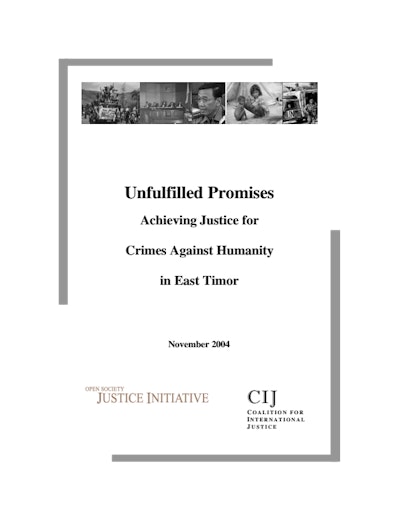Unfulfilled Promises: Justice in East Timor
A report by the Open Society Justice Initiative and the Coalition for International Justice entitled Unfulfilled Promises: Achieving Justice for Crimes Against Humanity in East Timor, was sent on November 15 to UN Secretary-General Kofi Annan, relevant UN agencies and missions, the core group of states supporting justice for East Timor, and leading international and local nongovernmental organizations. The report—based on extensive research, interviews, and discussions in Indonesia and East Timor during August and September—calls for an international commission to oversee justice in the country.
EXECUTIVE SUMMARY
In the wake of the violence that engulfed East Timor in 1999 and marked the final bloody chapter of Indonesia's brutal 24-year occupation, the United Nations and the international community committed themselves to the principle that the perpetrators of these atrocities could not go unpunished. That commitment has not been fulfilled.
Despite the energy and resources that have been invested, both trial processes established after the 1999 atrocities—the UN-established Special Panels in East Timor and the Ad Hoc Human Rights Court in Indonesia—have failed fundamentally to bring to account those most responsible for the atrocities in East Timor. The UN is scheduled to pull out of the justice system in East Timor in May 2005.
To do so while allowing these serious crimes to remain un-redressed would undermine the ongoing process, in both East Timor and Indonesia, of building effective institutions to protect human rights and strengthen the rule of law. Furthermore, it would deeply compromise the credibility of the United Nations and the international community.
The Secretary-General has recently emphasized the UN's commitment to justice and accountability, as exemplified in his groundbreaking report on the rule of law and transitional justice (S/2004/616). In that report, he highlighted the need to embrace integrated and complementary approaches to justice in post-conflict societies, stating:
"The challenges of post-conflict environments necessitate an approach that balances a variety of goals, including the pursuit of accountability, truth and reparation, the preservation of peace, and the building of democracy and the rule of law."
We support that holistic approach.
In 2003 and 2004, the Coalition for International Justice and the Open Society Justice Initiative joined with other nongovernmental organizations in calling for the United Nations to establish an international Commission to assess the existing justice mechanisms for redressing the East Timor crimes and to recommend initiatives to remedy their failings. In September 2004, Louise Arbour, the UN High Commissioner for Human Rights, appointed Grant Niemann, an experienced international criminal lawyer, to review the justice processes in East Timor and Indonesia, and determine whether a UN commission should be established to make recommendations to the UN for remedying the failures. In the event Mr. Niemann and Justice Arbour recommend such a commission to the Secretary-General, this report is intended to lay the groundwork for a commission's task.
Our analysis and recommendations are informed primarily by our discussions in Indonesia and East Timor during August and September 2004 with survivors, judges, prosecutors, government policymakers, civil society representatives, and international observers. They are also based on our consistent monitoring of and involvement with the justice mechanisms in East Timor and Indonesia since the UN took over the transitional administration of East Timor in 1999. Our recommendations take into account and address the most substantial obstacles to securing justice, namely Indonesia's intransigence in shielding its officers from accountability and East Timor's present vulnerability and unwillingness to even request that Indonesia extradite indictees to the Special Panels in East Timor. These problems are exacerbated by limited international political will and competing demands on resources. We urge the international community not to give up on justice in East Timor. It is both essential and possible to establish a meaningful measure of legal accountability that also corrects the historical record of the violence. By thinking creatively and devising new justice mechanisms, the international community can overcome the obstacles that have hindered the search for justice to date, and help to establish long-term peace and stability in East Timor while strengthening the rule of law in Indonesia.
Topics
- Climate Justice
- Digital Rights and Fair Elections
- Discrimination and Racial Justice
- International Crimes
